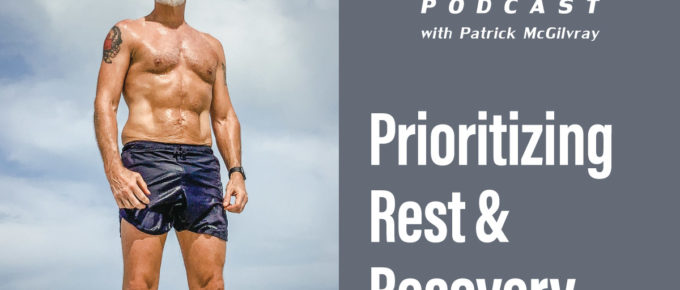If you’re anything like most runners, you have a very hard time taking time off. Rest days can feel like torture, you feel like you’re losing fitness, and you are convinced that your running is …
107. Prioritizing Rest & Recovery
Podcast Transcript
My name is Patrick McGilvray, and I’m an experienced marathoner, ultra runner, Sports Nutritionist, Master Life Coach, and weight loss coach for runners. I’ve dedicated my life to helping runners just like you properly fuel your body and your mind. So you can get leaner, get stronger, run faster and run longer than you ever thought possible. This is Running Lean.
Hey there, and welcome to episode 107 of Running Lean. My name is Patrick McGilvray, the weight loss coach for runners. And today I’m talking about prioritizing rest and recovery. If you are anything like most runners, then you probably have a pretty hard time taking time off right?
Rest days can feel like torture, you feel like you’re gonna lose your fitness and you’re convinced that your running is going to suffer, right? But the reality is most runners do not prioritize rest and recovery properly. So most runners are not getting the most out there training. You cannot become that lean badass runner you want to be if you never take the time to rest and recover properly. That’s just incredibly important. I cannot stress this enough.
That’s why I’ve dedicated this whole podcast episode to this topic, rest and recovery has to be part of your training plan. Okay, so today I’m going to just share the importance of prioritizing rest and recovery. I’m going to talk about how to do it because I want you to be able to show up at the start of your race in peak fitness and you cannot do it if you’re not taking rest days properly.
Okay. But first, if you like this podcast, please come check us out on Facebook, you can join the Running Lean Community. It’s a group of like-minded runners that support encourage and motivate one another. You can ask questions you can get answers. Get the kind of like, the camaraderie that you get from your running pals, you know, and I do some weekly coaching and training in the group. And we just have a lot of fun. It’s one of the most positive communities that I’ve experienced on Facebook. And a lot of people tell me that too. That’s not just my opinion. This is what I hear from other people.
And the Facebook group is full of people that are just like you people that are tired of struggling and ready to become more I talk about this all the time, we are people that are becoming more. If you’re tired of struggling or if you’re tired of feeling sluggish all the time. If you’re tired of gaining and losing the same 10-20 pounds over and over again. If you’ve ever been there, it’s not a fun place to be. I’ve been there.
If you’re done with all the like fad diets and meal replacement shakes. If you’re ready to end all this struggle with you know not feeling how you know you should feel, then I want to encourage you to take action for yourself. Nothing changes if nothing changes, right. So I want to encourage you to get into action starting now. I want you to start this new year, by learning how to create the good habits you need to make eating healthy a permanent part of your life.
Listen, we’re not interested in short-term results here. We’re focused on the long game. I want to help you make being healthy, just a part of who you are from now on out. And the easiest way to get there is to have someone there guiding you every step of the way, helping you overcome the things that you always struggle with. Like giving into cravings on the weekends like you do find all week long, and then the weekend comes along, you just blow it right, you keep reverting back to these old patterns of behavior. Having a coach means that you have someone in your corner, someone supporting you, someone who’s got your back, someone who’s holding you accountable to do the things you need to do to become the healthiest, most badass version of yourself.
I want you to make this year count. I want this year to be the year that you finally take control of your health and fitness for good. I want you to make this the year that you finally become the lean, strong, badass runner that you’ve always wanted to be. Everything I do here on the podcast and in the Facebook group I do with my group program with my one on one coaching clients is to help you to become the most amazing, most better version of yourself yet. And I put my heart and soul into doing this.
I put my heart and soul into helping you become your best self. Why? Because I want to be an example of what’s possible and I will inspire you to do the same thing and so on and so on. I’m on a mission to create a ripple effect of health and positivity in this world. But it requires action change requires action. So I want to encourage you to take action now. And make this the year that you make some permanent changes for yourself and become that badass runner that badass version of yourself that you know, you can be.
You can apply for coaching over at runningleanpodcast.com/apply. Let’s do this. Let’s make this your year. Cool.
Okay, let’s get into this topic of prioritizing rest and recovery. And let me tell you a little bit about why I’m thinking about this so much right now, you’ve probably heard me talk about this already, I’ve been kind of talking about this on the last couple of episodes, that I’ve been sort of forced to rest, right. I’ve been forced to take some time off from running from lifting weights from really doing any kind of strenuous activity at all.
So six weeks ago, I had rotator cuff surgery to repair three torn muscles in my rotator cuff. This is a pretty brutal recovery from this surgery. It is a long process is like three or four months of really not being able to do a whole lot. You know, I mean, I’m in physical therapy, I’m starting to get more active and starting to move things around a bit. But it’s still, you know, I’m still in a pretty good amount of pain. And there’s still a very limited range of motion. I’m only about halfway through this recovery process, right. And then, and this is something I really haven’t talked about before.
Back in September, of this past year, I developed a hernia and probably developed that from, you know, some really heavy weight lifting. Maybe I did something wrong. I’m not really sure exactly how I did it. It’s sort of just kind of appeared one day. And I was like, well, that’s weird what’s going on there when saw the doctor.
And yeah, so I had an inguinal hernia that needed to get repaired. And because of COVID, and because of the way the hospitals have been jammed up and stuff like that, I had to wait. I had to wait. And I had to push that surgery off until just a week ago. So I had to finish up my marathon training and run a marathon with a hernia, this is not a good situation to be in. I’m just going to tell you right now.
I ended up having this like neoprene belt that I wore under my clothes to kind of hold things so that I could actually run. But I’m telling you right now having like this shoulder pain, and then having a hernia at the same time made this whole marathon experience that much tougher and more challenging for me, but I got through it, okay. And I finally had the hernia surgery a week ago. And so within five weeks, I’ve had two pretty major surgeries.
Alright. So I started to make some progress, I started to get back to the gym, up until you know, had hernia surgery. So now I’ve got to like scale everything back. Again, I can’t lift anything more than 20 pounds, I can’t do any strenuous activity for six weeks, which is kind of fine. It’s kind of just goes along with what I’m doing with my rotator cuff recovery period here.
So long story short here, I’ve experienced a lot of downtime, right? I’ve just been like having to take time off. And it’s gonna be a while for me until I get back to where I want to be and the level of activity and doing all the things that I want to do again. But this really got me thinking about how hard it is for runners, especially to take time off.
It’s really hard to just give yourself a rest especially when you’re in training mode, especially when you’re in the thick of your marathon training, let’s say prioritize prioritizing rest and recovery days is something that runners just they don’t do well, right runners don’t like to rest they’d rather just go go go go go, go, go. And when you can’t just go go go all the time it can be very frustrating. Right?
You feel bad when you can’t run or you can’t do a workout. And so most runners just don’t do it. They don’t make rest and recovery days a priority. It’s like the last thing they want to do, right? So most runners just would rather do anything than take a rest day. Right? It’s so hard like mentally, physically. Emotionally.
It’s hard to tell yourself that this is an important part of your training plan. So most people just don’t include this kind of rest and recovery time as part of their training program. Okay. So why wouldn’t we do this though? Like, why? Why aren’t we making rest and sleep and recovery time a priority?
And I think it goes back to like this mindset of like, if you’re not doing something active, if you’re not like moving and pushing, and just grind in and out all the time, that you’re going to lose fitness, that you’re not going to perform as well, on race day, that you’re going to be taking steps backward.
And I have to say that this is absolutely not true. In fact, if anything, the opposite is true. If you want to perform well on race day, if you want to maximize your training program, whatever it is, you’re training for, whether it’s a 5k, half marathon, marathon, whatever, you’re doing yourself a disservice by not prioritizing rest and recovery days. All right, you are doing yourself a disservice. And you’re actually going to perform worse than if you are making rest and recovery part of your training program and a priority. Okay.
So here, I just want to kind of list out some of the problems that happen when you don’t prioritize rest and recovery when you don’t take the time off that you need. In order to give your body a chance to kind of heal and repair and recover from your hard workouts right? Not prioritizing rest and recovery days will have a bunch of negative impacts on your running performance, and basically your overall health and fitness.
Okay, so here are some of the things that we need to be careful of, right. First of all, running is catabolic, it breaks you down, if you’re just running all the time, you are just constantly breaking yourself down. So when you run, especially when you do like a hard workout, there are micro microscopic muscle tears that happen in your, in your muscles, in your legs, in your arms, in your glutes, and it’s very much like weight training.
You know when you lift heavy weights, you get these microscopic tears in your muscles. And then you give yourself a chance to rest and recover and your body repairs and get stronger. Right, you don’t gain muscle at the gym, you gain muscle on your rest days you gain muscle while you’re sleeping and recovering. And it’s the same thing with running Okay.
Without the rest and recovery days, your body will not heal properly, okay, you’re not going to adapt your body to the training load that you’re putting yourself under. Right, so this goes to the overload principle which I’ve just kind of talking about here, which is you overload a muscle. So you put a strain on a muscle to the point where you get to failure on a muscle and you overload that muscle.
You cannot lift the weight you’re trying to lift that creates an adaptive response in your body and your muscle grows stronger and bigger in response to that overload. The same thing happens with your other systems in your body like your cardiovascular system okay. You overload the cardiovascular system by doing something like a sprint workout, right you go out there and crush a hard you know hit training or interval workout you know, hill repeats or you know, sprints or whatever, and your cardiovascular system in response will will improve it will get stronger, right? It’ll become more efficient.
But this does not happen while you’re doing it. It only happens on the rest and recovery days. It happens when you are taking the time off when you are inactive. So, rest and recovery are required for this overload principle for this adaptive training principle to actually take place okay?
So if you’re not giving yourself the time off that you need, you’re just going to be constantly in that breaking down mode, right, you’re just breaking yourself down. And you’re never really giving yourself a chance to repair and adapt and get stronger. Okay. So that’s one of the biggest reasons why you have to prioritize rest and recovery.
The third thing to think about is this: when you are going hard all the time, you are putting your body under a lot of stress. And chronic stress will keep your cortisol levels very high, all the time. Cortisol is a stress hormone. And when cortisol is high, you actually get this like increase of blood sugar, you get this insulin response because of the cortisol. And you kind of keep your body in this fight or flight mode, you keep your body in this fat storage mode, you keep your body in this place where it makes it very hard to burn fat. It makes it very hard to become fat-adapted, which makes it very hard to get the most out of your training. Because you’re just overstressing your body, you’re chronically stressed out.
Chronic stress is not a good thing, right? I think we can all agree on this, right? And this idea of running hard or medium hard all the time is going to keep your body in that chronically stressed state. Okay, so too much stress on your body, constant stress on your body is going to have a definite negative impact on all the good things you’re trying to do for yourself here. Okay?
What we’re really talking about here is overtraining. Overtraining means you’re just not giving yourself the rest and recovery time that you need. Okay. Overtraining can lead to not just chronic stress, not just like breaking yourself down. But also you can be chronically fatigued. So you can just feel tired all the time. And if you’ve ever experienced this, believe me, I have.
I have done some training cycles where I was running like six days a week. And on those off, off days, quote, unquote, off days, I was like doing something else really active. And I was never getting a good night’s sleep, I was never giving my body a chance to recover. And I was like, I would get sick, I would be tired all the time. couldn’t keep my eyes open, like I was crashing and burning every afternoon like just, this is not a good place to be in right, this is not good for your, for your overall health and fitness much, much less for your training program.
If you’re training for an ultra marathon or you’re training for a marathon or half marathon or whatever it is, you cannot perform your best if you’re chronically fatigued if you’re just tired all the time. And sleep is another component of this, which I’m not going to get into today.
But I just want you to know that getting a good night’s sleep is a key component of rest and recovery. I want to do a whole other episode just on the importance of sleep because there are so many studies that have been done. And so much evidence out there that says that first of all, we are chronically under, we’re not getting enough sleep like we are a nation of people who are chronic under sleepers like we’re not getting enough sleep.
We need something like 7-9 hours of sleep a night and if you’re training hard, especially at the peak of your training cycle, you need more you might need 9 or 10 hours of sleep. But most people a lot of runners I talk to most will say they don’t get enough sleep and most will say they’re getting somewhere between like 5, 6, 7 hours of sleep which I don’t think is enough.
But if you’re experiencing this chronic fatigue, if you’re experiencing being chronically stressed out sleep could be a big part of this, okay? Another thing is that when you are chronically overtraining when you’re not getting enough rest and recovery, your running, performance will suffer. You will see your workouts really start to suffer, okay. Your workouts are going to start to feel harder than they are. So that rate of perceived exertion the RPE you know, when you go out there and run and you’re like this feels pretty easy. Or whoa, this workout feels really hard for the same effort.
Those workouts are gonna feel much harder if you’re not prioritizing rest and recovery properly. So just know that if your workouts if you’re out there running, you’re like, ‘I don’t know why running feels so hard right now’, it could be that you’re just not getting enough rest. It could be that you’re just in that chronic cardio chronically stressed out, chronically overtrained state. All right, like prioritize rest and recovery days here.
Another thing is that not only will your workouts feel harder, but your endurance starts to tank like you won’t be able to run as long, you won’t be able to go as far. And it’s gonna be, it’s gonna really create this negative impact on your endurance.
So if you’re somebody who’s out there trying to run, you know, you’re training for a marathon and you’re trying to get, you know, you got your 18-20 mile runs coming up, and you just feel like you just can’t do it, you’ve got no gas in the tank. It could be that you’re just not taking the time off that you need, you know, your endurance will suffer the more overtrained that you are.
And it sounds so counterintuitive, doesn’t it? It’s like, ‘Well, shouldn’t you just keep going longer and longer and harder and harder?’ And the answer is no, you have to like, push hard, and then you have to back off. You have to go longer, and then you have to go, you know, shorter. You have to run longer distances, and then you have to back it off, you have to have hard days, you have to have super easy days, and you have to have rest days. Right.
Another key aspect of this that most people don’t really realize is that chronically overtraining and not getting enough rest and recovery can have a negative impact on your mental state. Your mindset is so important. And I talk about this all the time mindset is like 80% of the equation.
If you’re trying to lose weight, if you’re trying to change habits, if you’re trying to like create a better relationship with food, if you’re trying to improve your running, if you want to run your first marathon or PR – 80% of your results are going to be because you have the right mindset. 20% is going to be based on what you’re doing what you know, what you don’t know, things like that.
But 80% of this is mindset. And if your mindset is negatively impacted, because you’re overtraining, you’re not going to be as clear headed, you’re not going to be able to focus as much, your head’s not going to be in the game.
You know, you’re gonna be moody, you know, you’re not in a good mood, you’re like a grumpy person. Are you a grumpy person? Maybe you’re overtraining. And all this can lead to this dip in motivation to you can really start to feel like, ‘Oh, I just don’t want to run, I don’t feel like it. I’m in a bad mood. I can’t think clearly.’ And then doubt starts to creep in. And just don’t feel like running and you just like, want to give it up, you just want to like just lay on the couch watching Netflix, right.
And all of this can just be a result of not giving yourself the rest that you need. Okay. And then obviously, all of this can affect your race day performance. If you’re somebody that’s out there training for a race, and you know, you’ve got a marathon coming up. And you’ve been training for, you know, six months, or even if it’s just like three or four months of a training program, you’re putting a lot of effort, you’re putting a lot of energy, you’re putting your heart and soul into training for this race, and everything needs to be perfect on race day, right?
Everything needs to be in perfect working order. And overtraining can just have you showing up on race day, and ready for like disappointment, feeling like crap, poor performance. You know, you’re gonna feel like you’ve wasted all this time training when really all you did was you just overtrained, right? You just overtrain, you didn’t give yourself the rest and recovery that you needed so that you could show up on race day properly.
I was just talking to somebody last night about tapering, right. So you know, somebody who’s one of my clients, you know, they’ve got a marathon coming up this weekend, and they’re in this taper mode, and they’re just like, Ah, it’s driving me crazy. I hate tapering. I just want to be active, I want to be moving.
But the important thing to understand, here’s that tapering is there for a reason, right? You have to show up on race day fully rested and recovered and ready to go. If you’re just like going hard, hard, hard, all the way up to race day. You are not optimizing your body in your mind for that race. You’re going to be you’re going to show up overtrained and you’re going to show up tired and you’re going to show up stressed out and you’re not going to have a good day out there. Okay.
When you start making rest and recovery days a priority. You give your body a chance to rebuild, to repair. And to recover from all those hard workouts, we want to do the hard workouts, you want to be able to go hard on your hard days and make your easy days super easy, right?
When you are properly rested, and you can recover, and you’re repairing from these hard workouts, I’m going to tell you something, those hard days, you’re actually going to be able to go harder, you’re going to be able to run faster, you’re going to be able to run harder, you’re going to be able to run longer, which means that if you do it the right way, you should improve your fitness exponentially.
Because you’re giving your body a chance to adapt to your training load. Right, you’re improving the systems, you’re improving your cardiovascular system, you’re improving your your body’s ability to oxygenate your muscles, you’re improving your ability to get stronger, like you’re building stronger muscles, you have to give your body a chance to adapt. And that’s what happens during the rest recovery phase, okay.
You’ll be able to increase the intensity and the duration of your workout. So you can go longer without feeling fatigued. But it requires rest and your workouts will actually feel easier. So not only will you be able to go harder and things like that, but you know, your rate of perceived exertion actually goes down.
So that same run that you did when you were chronically stressed out, that same workout is gonna feel so much easier because you’re properly rested. And then there’s all these positive mental benefits to like you’re you feel more clear headed, you’re more focused, you can concentrate, you have improved cognition, you’re going to feel happier, you’re not going to be all moody and grumpy and negative, you’re going to be more positive.
And this goes a long, long way to your running performance, you know, you’re going to wake up feeling motivated, ready to go get out there and get at it. And then, you know, obviously showing up on race day, you’re going to be giving your body everything that it needs, you’re going to be setting yourself up for success. You’ve given your body the exact formula that it needs for adaptation, go hard, rest and recover, go hard rest and recover.
So that on race day, you show up at that starting line and you’re just firing on all cylinders, you’ll be operating at peak performance, you’ll be stronger, faster, and ready to go. That’s what we want. That’s what we want out of our training plans. Okay.
So rest recovery means just that just means like, you gotta like, take some time off, okay? The ideal way to do this is to just take a day off, take a day or two off every week. This is ideal. And I know that for a lot of people, they’re like, ‘I just need to do something.’ It’s like, okay, fine. You can have active recovery days, but they have to be a very minimal activity, like taking a walk.
And a lot of people are like, ‘I walk my dogs every day. I’ll go walk the dogs or I’ll go for a bike ride with the kids, you know, we’re just like on the bike’s just like really easy. Or maybe I’m going to do some stretching and foam rolling, or some gentle yoga.’
Those kinds of things are fine as recovery days, you know, those kind of active recovery days, but there’s nothing wrong with just taking a day off, you’re not gonna lose fitness if you do nothing for a day or two every week, right?
The idea is that you’re feeling fresh. The idea is that you’re repairing and you’re adapting and you’re becoming stronger so that you can go harder at your next workout. So I want you to start prioritizing rest and recovery days, put them on your training schedule. Schedule, rest and recovery days into your weekly training regimen. Right.
And rest days are not just for the early stages of your training cycle. In fact, it’s even more important that the harder you’re working out, the more intense and the longer duration of your training, the more important rest days become. Right as you get closer to your race, your intensity and your duration of running are going to increase right?
So those are the times when you need to prioritize rest days even more. And the cycle looks like this. It’s like you go harder, you rest, adapt, you get stronger, you go hard, you rest and adapt, and you get stronger, and then just kind of repeats throughout your training program.
And then there are other times where you might consider taking rest days, or you might be forced to take rest days, and I’m going to encourage you to just like, lean into this a little bit. It’s kind of like what I’m doing right now, like, I had surgery. And it’s gonna be, it’s not just a day or two, for me, this is like weeks and months of time off, and I’m okay with that. I’m okay with that.
For me, I know I am losing some fitness, I’ve lost some weight, I’m losing some muscle during this process, I’ll get it all back, and it’ll come back. Fast, it’ll come back, you know faster than it went off. I’m going to take the time and make this work, I’m going to become the strongest, most badass version of myself. This year, this is my goal, right?
So I’ve got to give myself a chance to recover. This is some pretty brutal stuff I’ve gone through here, I’m going to give myself a chance to recover. If you get sick, a lot of people are sick with COVID and stuff, you know, you need to take some time off, just embrace it and really give your body a chance to recover.
Because if you’re sick, and you’re like, I’m just gonna keep pushing through this, I’m going to keep pushing through this, you’re probably going to prolong the time it takes you to recover, I’m going to want to do that right. Or maybe you have an injury that you need to take a little bit of time off from, take the time off, it’s gonna be okay. And then like, take time off after a race, obviously, you know, anytime you have like a super intense workout or race, you got to take some time off from that, okay?
If you’re the kind of person who lays it all out there on race day, then you have got to take some time off. After that, prioritize rest and recovery, put it into your training schedule. And I promise you, you’re going to feel better your runnings going to improve, you’re going to be able to go harder and longer and faster. And you’re just going to become the healthiest version of yourself.
Okay, so make sure you’re making rest and recovery days a priority. All right. Cool. Well, I hope you guys got something out of this today. Love you all. Keep on Running Lean, and I will talk to you soon.
If you’re a runner and you’ve been struggling to lose weight or you keep losing and gaining the same 10 pounds over and over again. Or you’re finally ready to get to your natural weight and stay there for good this time then I have something you will love. I’ve created a powerful new training just for you called running lean for life. You’ll learn exactly how to transform yourself into a lean fat-burning running machine. So you can run without bonking, lose weight without calorie counting and develop the habits required to make it last for life. To get this free training right now go to runningleanpodcast.com/leanforlife and start your transformation today.






